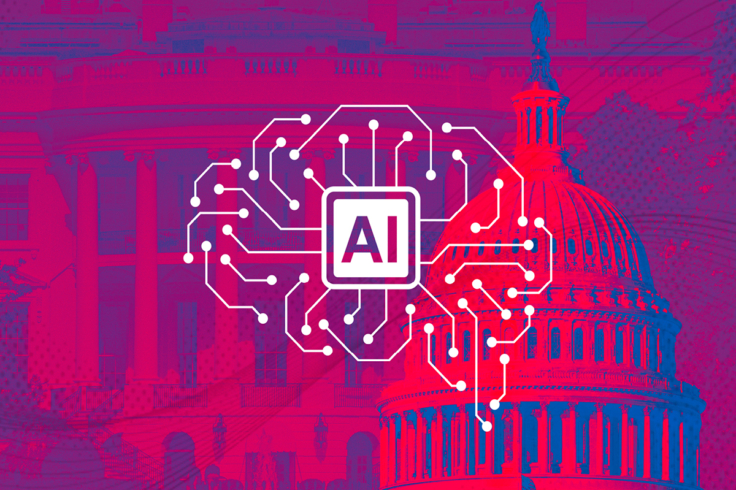As AI Use Skyrockets, Congress Springs into Action
With the rapid acceleration of artificial intelligence (AI) in our daily lives, policymakers on the federal and state levels have been debating how to regulate this technology effectively. As we covered in the July edition of Inside Story, state legislatures have largely led legislative efforts to regulate AI technologies to date, but as pressure mounts for federal action, momentum to find a comprehensive policy solution has been growing in Congress.
Over the past several months, dozens of bills have been introduced, several committees have held hearings, and Senate Majority Leader Chuck Schumer has convened six AI “Insights Forums” that have brought together Members of Congress, industry leaders and AI experts as Congress weighs regulating AI and other emerging technologies. And while there is a strong consensus that effective regulations are necessary, the debate over how to address the risks of a rapidly evolving technology remain a challenge.
With the next election cycle less than a year away, there is a growing fear that AI-generated materials will lead to an unprecedented rise in misinformation about the election. A new poll released this month by The Associated Press-NORC Center for Public Affairs Research and the University of Chicago Harris School of Public Policy found that a majority of Americans (58%) believe AI tools will increase the spread of false and misleading information during the 2024 presidential election. There is strong support for federal action on this issue with 66% of Americans stating they support a federal ban on false or misleading AI generated images in political ads.
Voters have reason to be concerned. With no federal rules in place to govern the use of AI-generated content in campaigns, we’ve already seen political ads with fake images, videos and audio clips created with generative AI during this year’s primary elections.
The growing spotlight on this issue has gained the attention of the Federal Election Commission (FEC). The agency announced in August that it was considering new rules around regulating AI-generated content in political advertising, such as prohibiting the use of AI to misrepresent a candidate fraudulently or by requiring a disclosure for AI usage in political ads, but there is currently no date set for when the commission will finalize its decisions.
In recent months, Congress has zeroed in on this issue. AI’s potential threats to democracy and U.S. elections was not only the focus of Senate Majority Leader Chuck Schumer’s most recent AI “Insight Forum,” but he has indicated that getting legislation passed within months to address the effect of AI on elections is a top priority.
One legislative proposal that is quickly gaining traction is the Protect Elections from Deceptive AI Act, which was introduced in September by a bipartisan group of U.S. Senators, including Amy Klobuchar (D-Minn.), Josh Hawley (R-Mo.), Chris Coons (D-Del.), and Susan Collins (R-Maine). The bill would ban the use of artificial intelligence (AI) to generate materially deceptive content falsely depicting federal candidates in political ads to influence federal elections. The legislation, which has been endorsed by Microsoft, remains in committee and it is unclear when the measure will advance.
In the absence of federal legislation, tech giants like Meta and Microsoft have announced voluntary proposals to address AI’s risk of accelerating misinformation, particularly during the upcoming election season. Just this month, Meta announced it will require advertisers to disclose the use of AI in any political ads that will run on Facebook and Instagram. Microsoft also announced it will launch a digital watermarking tool for political ads to provide users with information on advertisements. While these efforts are well-intended and useful, we cannot rely solely on voluntary disclosure policies. Congress and the White House need to act.
A comprehensive federal AI framework may still be years away, but action on smaller challenges, like AI’s use in campaign advertising, may be a more attainable short-term goal. But until a larger framework is created, Congress will continue to race against time to catch up legislatively to a rapidly advancing AI industry.



